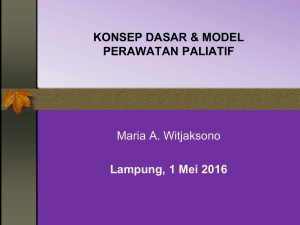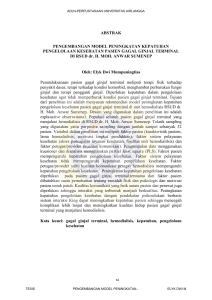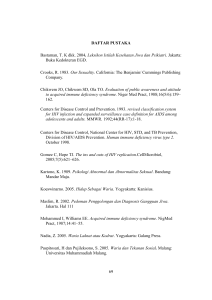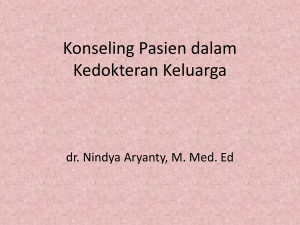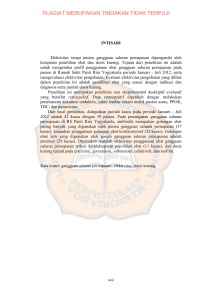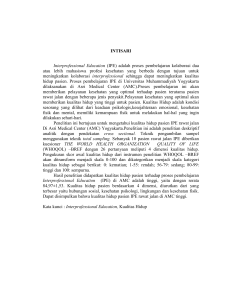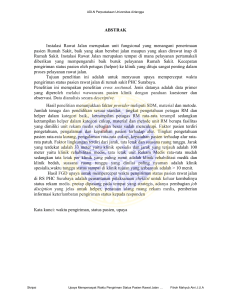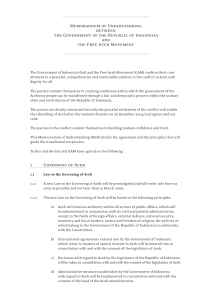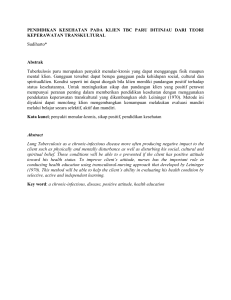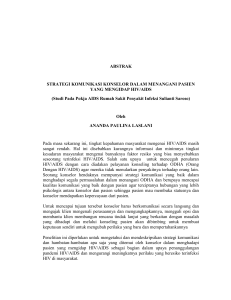Discharging Mental Health Patients in Aceh (PDF
advertisement
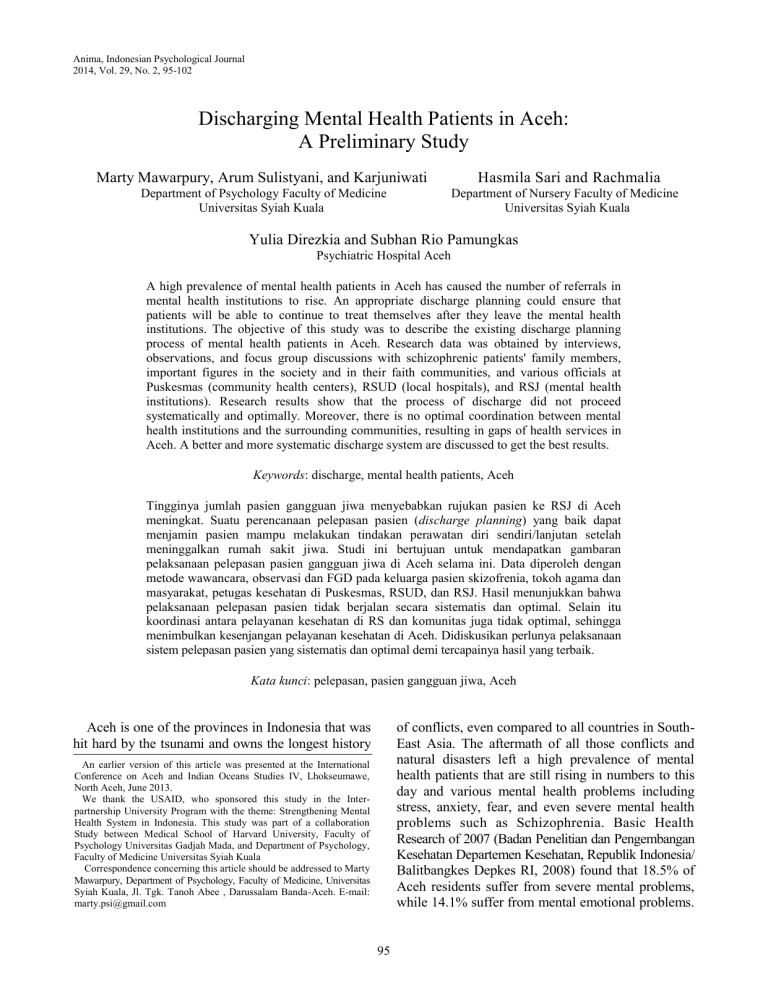
Anima, Indonesian Psychological Journal 2014, Vol. 29, No. 2, 95-102 Discharging Mental Health Patients in Aceh: A Preliminary Study Marty Mawarpury, Arum Sulistyani, and Karjuniwati Department of Psychology Faculty of Medicine Universitas Syiah Kuala Hasmila Sari and Rachmalia Department of Nursery Faculty of Medicine Universitas Syiah Kuala Yulia Direzkia and Subhan Rio Pamungkas Psychiatric Hospital Aceh A high prevalence of mental health patients in Aceh has caused the number of referrals in mental health institutions to rise. An appropriate discharge planning could ensure that patients will be able to continue to treat themselves after they leave the mental health institutions. The objective of this study was to describe the existing discharge planning process of mental health patients in Aceh. Research data was obtained by interviews, observations, and focus group discussions with schizophrenic patients' family members, important figures in the society and in their faith communities, and various officials at Puskesmas (community health centers), RSUD (local hospitals), and RSJ (mental health institutions). Research results show that the process of discharge did not proceed systematically and optimally. Moreover, there is no optimal coordination between mental health institutions and the surrounding communities, resulting in gaps of health services in Aceh. A better and more systematic discharge system are discussed to get the best results. Keywords: discharge, mental health patients, Aceh Tingginya jumlah pasien gangguan jiwa menyebabkan rujukan pasien ke RSJ di Aceh meningkat. Suatu perencanaan pelepasan pasien (discharge planning) yang baik dapat menjamin pasien mampu melakukan tindakan perawatan diri sendiri/lanjutan setelah meninggalkan rumah sakit jiwa. Studi ini bertujuan untuk mendapatkan gambaran pelaksanaan pelepasan pasien gangguan jiwa di Aceh selama ini. Data diperoleh dengan metode wawancara, observasi dan FGD pada keluarga pasien skizofrenia, tokoh agama dan masyarakat, petugas kesehatan di Puskesmas, RSUD, dan RSJ. Hasil menunjukkan bahwa pelaksanaan pelepasan pasien tidak berjalan secara sistematis dan optimal. Selain itu koordinasi antara pelayanan kesehatan di RS dan komunitas juga tidak optimal, sehingga menimbulkan kesenjangan pelayanan kesehatan di Aceh. Didiskusikan perlunya pelaksanaan sistem pelepasan pasien yang sistematis dan optimal demi tercapainya hasil yang terbaik. Kata kunci: pelepasan, pasien gangguan jiwa, Aceh Aceh is one of the provinces in Indonesia that was hit hard by the tsunami and owns the longest history of conflicts, even compared to all countries in SouthEast Asia. The aftermath of all those conflicts and natural disasters left a high prevalence of mental health patients that are still rising in numbers to this day and various mental health problems including stress, anxiety, fear, and even severe mental health problems such as Schizophrenia. Basic Health Research of 2007 (Badan Penelitian dan Pengembangan Kesehatan Departemen Kesehatan, Republik Indonesia/ Balitbangkes Depkes RI, 2008) found that 18.5% of Aceh residents suffer from severe mental problems, while 14.1% suffer from mental emotional problems. An earlier version of this article was presented at the International Conference on Aceh and Indian Oceans Studies IV, Lhokseumawe, North Aceh, June 2013. We thank the USAID, who sponsored this study in the Interpartnership University Program with the theme: Strengthening Mental Health System in Indonesia. This study was part of a collaboration Study between Medical School of Harvard University, Faculty of Psychology Universitas Gadjah Mada, and Department of Psychology, Faculty of Medicine Universitas Syiah Kuala Correspondence concerning this article should be addressed to Marty Mawarpury, Department of Psychology, Faculty of Medicine, Universitas Syiah Kuala, Jl. Tgk. Tanoh Abee , Darussalam Banda-Aceh. E-mail: [email protected] 95
